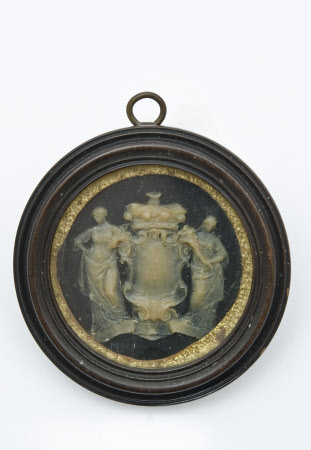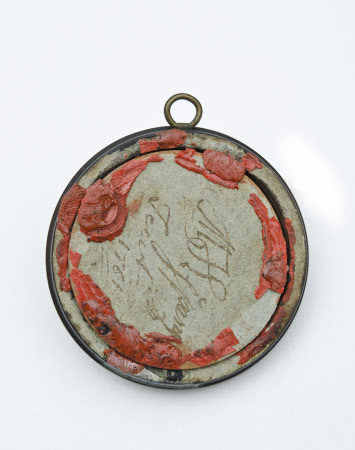The Scarsdale coat of arms
Michael Henry Spang (fl.c.1750 - d.London 1762)
Category
Art / Sculpture
Date
1761
Materials
Wax on slate, framed with gilt mount, wood, board and glass, sealed with red wax
Measurements
65 mm (Diameter)
Order this imageCollection
Kedleston Hall, Derbyshire
NT 109110
Summary
Wax on slate, framed with gilt mount, wood and board sealed with red wax, model for a medal of the Scarsdale coat of arms, Michael Henry Spang (d. 1762), 1761, scratched onto slate 'M.H.S.' bottom left; inscribed in pen and ink 'MH Spang Z Fecit | 1761' on back of board. A wax on slate model for a medal of the Scarsdale coat of arms, in wax relief built up on a roundel of slate, mounted with coarse-grained gilt board, backboard, glass and turned wooded frame, sealed with red wax. The achievement shows Prudence holding a mirror at left and Abundance holding a cornucopia at right, supporting an escutcheon crested with a baron's coronet.
Full description
This tiny, exquisitely carved relief is a medallic design. Wax was used as a sculpting material for preliminary models because it was cheap, quick and malleable. Wax would be softened and modelled in a similar way to clay, with forms gradually built up in layers and then finished with tools. The design is by Michael Henry Spang, the Danish sculptor who began working for Nathaniel Curzon, 1st Lord Scarsdale (1726-1804), in 1758. He is the creator of a set of four statues in wood (NT 108997) at Kedleston, and of several chimneypieces in the State Rooms (see, for example, NT 107982 in the Dining Room). He also produced for Curzon designs for a ceiling, a bridge and a pavilion (NT 109248, 109249, 109499), a drawing of a mournful Sigismunda (NT 108920), and acquired a model of a British warship (NT 109114). Alice Rylance-Watson March 2019
Provenance
Acquired by Nathaniel Curzon (1726-1804) from Michael Henry Spang; gifted to the National Trust in 1986 by Francis Curzon, 3rd Viscount Scarsdale (1924-2000).
Credit line
Kedleston Hall, The Scarsdale Collection (acquired with the help of the National Heritage Memorial Fund and transferred to The National Trust in 1987)
Marks and inscriptions
Front, bottom left: M.H.S Back: MH Spang | Fecit | 1761
Makers and roles
Michael Henry Spang (fl.c.1750 - d.London 1762), sculptor

